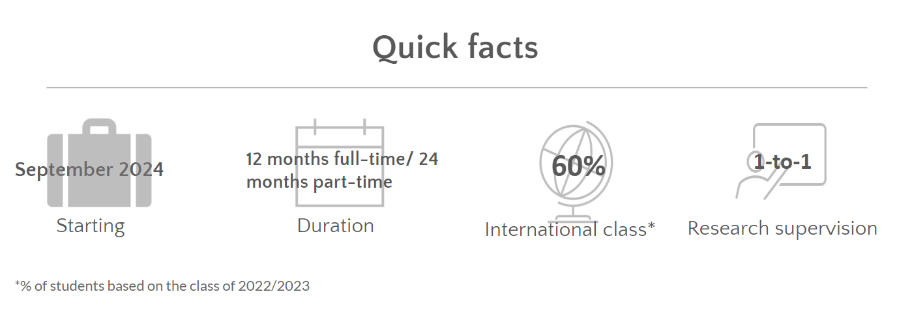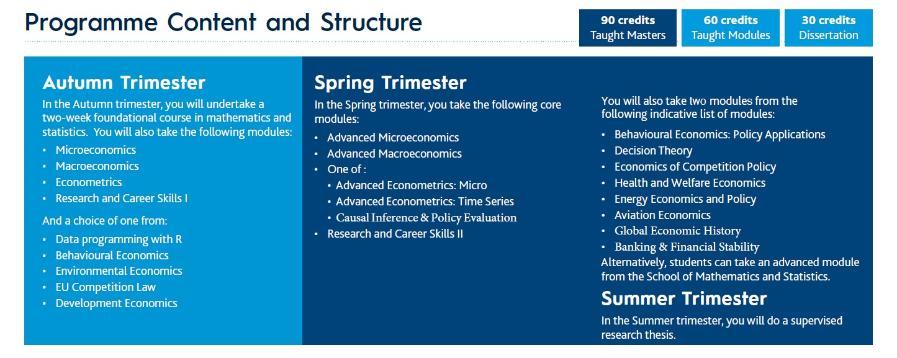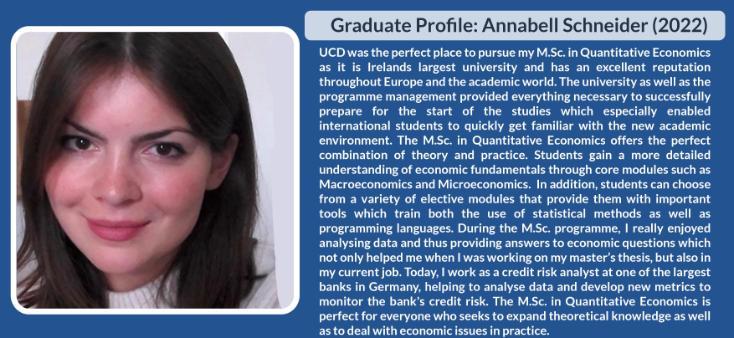MSc in Quantitative Economics
MSc in Quantitative Economics
Quantitative training in economics for a research-oriented career
Applications for the 2024/25 are accepted on a rolling basis and will close on 31st of August 2024.
For information on fees and how to apply, please click here. For scholarships/fee waivers please check here.
This course provides high-quality quantitative training in economics, with a focus on advanced research methods. Students get a rigorous grounding in using mathematical and statistical methods to derive, test and apply formal economic models. The program focuses on developing students’ analytical skills, econometric expertise, and mathematical modelling skills, preparing them for PhD-level studies or professional economist roles requiring the application of analytical methods to economic problems.
This programme features small group teaching from leading economists and a supportive environment. Masters students are an integral part of our School community, attending research seminars and receiving a wide range of support to help them prepare for the research thesis element of their degree, including 1-to-1 supervision and training classes on conducting and presenting economic research.

UCD School of Economics is Ireland’s leading economics department. Our staff are experts with an international reputation in a wide range of topics such as macroeconomics, econometrics, applied microeconomics, behavioural economics, health economics, international trade, and economic history. School members play a significant role in debating economic policy issues and in contributing to the formulation of economic policy. Students get to know our staff via participation in small classes and seminars and through direct supervision.
Your MSc experience in UCD
 More details on the various modules and what you will learn: here
More details on the various modules and what you will learn: here
Career Opportunities
Graduates of our master's programmes have gone on to complete PhDs in economics and pursue successful careers as academic or research economists. Many have also moved directly to employment in central banks, think-tanks, government departments, regulatory agencies, financial sector institutions and consultancy firms.
Past employers of MSc in Quantitative Economics graduates include: National Treasury Management Agency (NTMA), DZ BANK , AIB Bank, Fineco Bank, Irish Government Economic and Evaluation Service (IGEES), Central Bank of Ireland, Economic and Social Research Institute, and other leading national and international organizations and companies. PhD placements include: Cornell, EUI, Goethe University Frankfurt, University of Bologna, ESADE Business School, UCD School of Economics, Trinity College Dublin, KU Leuven.
Entry Requirements
- A primary degree with at least an upper second class honours or international equivalent in Economics or in a degree in which Economics is a major component.
- An upper second class honours in a Higher Diploma in Economics or in the MSc Qualifier.
- Applicants whose first language is not English must also demonstrate English language proficiency of IELTS 6.5 (no band less than 6.0 in each element), or equivalent.
Students have the possibility to switch after first term to our MSc in Applied Economics, which includes the option of a summer internship.

Programme Coordinator Dr Oana Peia (opens in a new window)oana.peia@ucd.ie